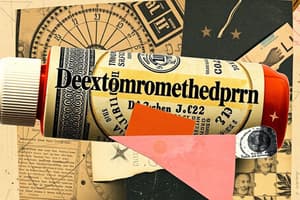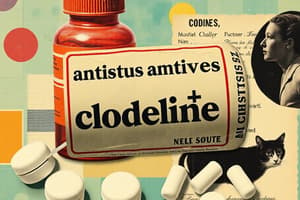Podcast
Questions and Answers
What is the therapeutic classification of Dextromethorphan?
What is the therapeutic classification of Dextromethorphan?
- Analgesic
- Antitussive (correct)
- Antibiotic
- Antihistamine
What is the pharmacologic classification of Dextromethorphan?
What is the pharmacologic classification of Dextromethorphan?
Levorphanol derivative
What is one of the therapeutic effects of Dextromethorphan?
What is one of the therapeutic effects of Dextromethorphan?
- Anti-inflammatory
- Weight loss
- Cough suppression (correct)
- Pain relief
Dextromethorphan carries a risk of dependence.
Dextromethorphan carries a risk of dependence.
How does Dextromethorphan act in the body?
How does Dextromethorphan act in the body?
What is the primary metabolism pathway for Dextromethorphan?
What is the primary metabolism pathway for Dextromethorphan?
What is one reported CNS toxicity symptom of Dextromethorphan abuse?
What is one reported CNS toxicity symptom of Dextromethorphan abuse?
Dextromethorphan can safely be used in children under 6 years of age.
Dextromethorphan can safely be used in children under 6 years of age.
What should be avoided when taking Dextromethorphan?
What should be avoided when taking Dextromethorphan?
Dextromethorphan is classified as a Category ______ drug in pregnancy.
Dextromethorphan is classified as a Category ______ drug in pregnancy.
What is the treatment for Dextromethorphan overdose?
What is the treatment for Dextromethorphan overdose?
A drug similar to Dextromethorphan is ______.
A drug similar to Dextromethorphan is ______.
Flashcards are hidden until you start studying
Study Notes
Drug Overview
- Dextromethorphan is classified as a nonopioid antitussive, with a therapeutic classification as an antitussive and pharmacologic as a levorphanol derivative.
- First approved in 1954, it is widely recognized for its effectiveness in treating cough.
Therapeutic Effects and Uses
- Dextromethorphan is considered equally effective as codeine without the risk of dependence.
- The FDA recognizes it as a safe and effective cough suppressant when administered at recommended doses.
- More effective for nonproductive coughs arising from chronic throat irritation (e.g., due to tobacco use or emphysema) than for acute coughs from colds.
- Reports of abuse began in the 1990s, with lower doses causing mild stimulant effects and very high doses leading to dissociative experiences.
- Duration of effects ranges from 6 to 8 hours, with abuse doses being 10 to 30 times greater than therapeutic doses.
Mechanism of Action
- Acts directly on the cough center in the medulla to elevate the cough threshold.
- Does not bind to opioid receptors, differentiating it from traditional opioids.
Pharmacokinetics
- Administered orally (PO) and is readily absorbed.
- May cross the placenta; specific distribution is unknown.
- Primarily metabolized in the liver by CYP2D6 and CYP3A to active metabolites.
- Excretion occurs via the renal route.
- Onset of action is between 15 to 30 minutes, with effects lasting 3 to 8 hours.
Adverse Effects
- At therapeutic doses, adverse effects are minimal. Possible effects include sedation and dizziness at moderate doses.
- Abuse cases may lead to CNS toxicity, with symptoms such as slurred speech, ataxia, respiratory depression, seizures, and coma.
Contraindications and Precautions
- Caution is advised in patients with hepatic impairment due to extensive liver metabolism.
- The FDA advises against use in children under 6 years and recommends extreme caution in treating children.
Drug Interactions
- Should not be used with MAOIs, triptans, or SSRIs due to the risk of serotonin syndrome.
- Can cause additive CNS depression when combined with alcohol, antihistamines, antidepressants, and opioids.
- May enhance the analgesic effects of opioids when co-administered.
- Grapefruit juice can increase serum levels of dextromethorphan, raising the risk of toxicity.
Pregnancy Category
- Classified as Category C, indicating that risk cannot be ruled out during pregnancy.
Treatment of Overdose
- Overdose presents risks of significant CNS toxicity; treatment is symptomatic management.
Similar Drugs
- Benzonatate (Tessalon) is a notable alternative to dextromethorphan.
Studying That Suits You
Use AI to generate personalized quizzes and flashcards to suit your learning preferences.




